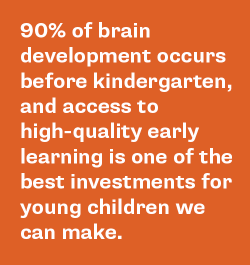Early Care & Education
Early Care & Education
Overview
 From increased school readiness to ongoing academic and social and emotional outcomes, the research is clear that the learning and support a child receives during their beginning years will have dramatic impacts when they go to school and later in life.
From increased school readiness to ongoing academic and social and emotional outcomes, the research is clear that the learning and support a child receives during their beginning years will have dramatic impacts when they go to school and later in life.
Early learning happens in the home, community, and for many children, in early care and education settings. Right now, however, only 51% of children have access to the early care they need. Our focus on early learning systems in Washington is centered on how to ensure young children have equitable access to high-quality early care and STEM experiences that will help them thrive in life.
Early mathematics learning is especially important because it is predictive of later learning outcomes. Children who start strong in math, stay strong in math, and outperform their peers in literacy too. The goal is to ensure that every child in our state has consistent access to opportunities for joyful and engaging STEM learning.
What We’re Doing
Investing in Promising STEM Practices
- Recruiting Child Care Champions: We are convening industry leaders from across the state to advocate for comprehensive solutions in our child care system. Learn how you can get involved.
- STEM Networks: We partner with ten STEM Networks across the state to identify local solutions that center community priorities. Early STEM programming and systems-level work is tailored in partnership with communities to ensure children, families, and educators have access to inspiring STEM learning opportunities and resources.
- Story Time STEAM in Action / en Acción is a community project that focuses on supporting equity in early mathematics for children and families through story time programming and the use of shared reading experiences to support the development of early math skills.
Leveraging Data and Engaging in Advocacy
- The new STEM by the Numbers dashboards track key indicators and systems inputs for early learning, K-12 and career pathways. The dashboards display, at the statewide and regional levels: Math Proficiency, FAFSA Completion rates, and Postsecondary Progress, including credential enrollment and completion.
- State of the Children
- Dashboard: Presents data on demographics, language, cost of care, and wage disparities from all regions across the state. This dashboard complements the regional and state-wide narrative reports. (Updated 2024.)
- Statewide and regional reports — Early Care and Education: In partnership with Washington Communities for Children, we’ve created a region-by-region, in-depth look at the state of our early learning and child care systems. The reports highlight data and information on the economic impact of child care on families and employers, the availability of and access to critical early childhood education, and more. (Updated 2023.)
- Regional reports — Economic Impact: Each year, the lack of child care costs Washington businesses over $5 billion dollars in lost earnings, productivity, and revenue. The Economic Impact regional reports provide data and recommendations to help employers lower absenteeism and create a workplace that supports families. (Updated 2024.)
- Child Care Business Feasibility Estimator (“Estimator”) is an online calculator designed to help potential child care business owners understand the likely costs, revenues, and feasibility for their child care business idea.
- Advocacy: We work in coordination with early learning policy and advocacy partners, including the Early Learning Action Alliance (ELAA) and others, to advance priorities focused on accessible and affordable early care and education, high-quality early learning, and systems alignment.
- Interactive data: In partnership with the Department of Children, Youth, and Families (DCYF), we created the Child Care Need and Supply Data dashboard. This tool reflects the current state of Washington’s child care capacity and demand and meets the need for regular, up-to-date data on child care and preschool needs in local communities.
Early Learning Resources
Reports: State of the Children: Early Learning and Care
Data tools: Child Care Need and Supply Data dashboard and Child Care Business Feasibility Estimator
Article: Washington State Early Learning & Care: Where Historic Underinvestment Meets National Health Crisis
Blog: State of the Children Co-design Process
Blog: Zeno Summer Institute: Creating Opportunity for Families of Color